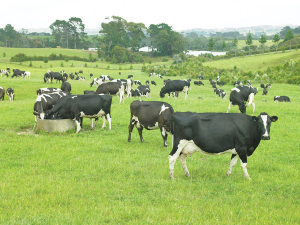MOU a significant milestone
The signing of a Memorandum of Understanding (MOU) between Lincoln University and Ballance Agri-Nutrients is being hailed as a significant milestone.
 The research also showed that the low MUNBV cows also yielded an increase in milk protein percentage.
The research also showed that the low MUNBV cows also yielded an increase in milk protein percentage.
New research from Lincoln University has revealed that the genetic disposition of dairy cows could significantly reduce nitrate leaching.
Lincoln University’s Pastoral Livestock Production Lab found that grazing dairy cows with low milk urea nitrogen breeding values (MUNBV) have a 28% reduction in the urinary urea nitrogen loading rate per urine patch than cows with higher MUNBVs.
The lowest MUNBV animals in the study excreted 165.3 g less urinary urea nitrogen per day than the highest MUNBV animals.
As an example, at four cows per hectare, this difference equates to 241kg urinary urea less deposited onto pasture, resulting in 41kg less nitrate leached per hectare per year.
The research, completed by PhD student Cameron Marshall, also showed that the low MUNBV cows also yielded an increase in milk protein percentage.
Lincoln’s Professor of Livestock Production Pablo Gregorini says the findings are very significant for farmers and the entire agriculture sector.
“Cameron’s work shows that the cows themselves are an important tool in helping to cut nitrate leaching and nitrous oxide emissions, and in helping farmers meet their regulatory reductions. To be able to do this and increase milk protein at the same time is a huge win:win for the sector.
“Most farmers’ herds will naturally comprise a mixture of low MUNBV cows and higher MUNBV cows, with the trait being identified through testing the milk. Simply identifying the animals with low MUNBVs will enable famers to breed from their existing stock and change the makeup of their herd over time.”
Research into the differences between low MUNBV and higher MUNBV animals will continue, with Cameron Marshall studying the data to identify where further benefit-yielding research should be directed.
New Zealand dairy processors are welcoming the Government’s commitment to continuing to push for Canada to honour its trade commitments.
An educational programme, set up by Beef + Land New Zealand, to connect farmers virtually with primary and intermediate school students has reported the successful completion of its second year.
The Food and Agriculture Organisation of the United Nations (FAO) has welcomed a resolution adopted by the United Nations (UN) General Assembly to declare 2026 International Year of the Woman Farmer.
Waikato herd health veterinarian Katrina Roberts is the 2024 Fonterra Dairy Woman of the Year.
Trade Minister Todd McClay says New Zealand has no intention of backing down in a trade dispute with Canada over dairy products.
Horticulture NZ chief executive Nadine Tunley will step down in August.
OPINION: Canterbury milk processor Synlait is showing no sign of bouncing back from its financial doldrums.
OPINION: It seems every bugger in this country can get an award these days.